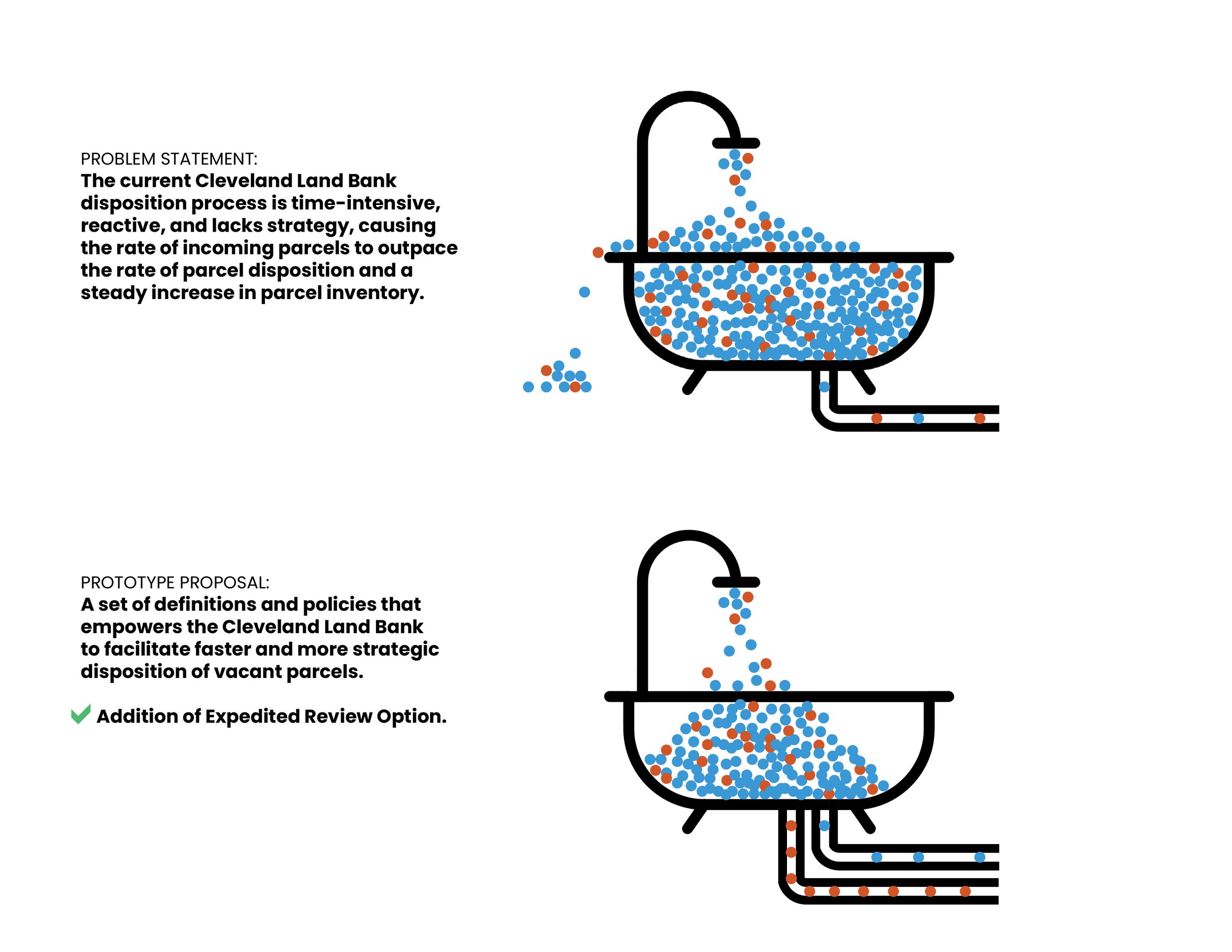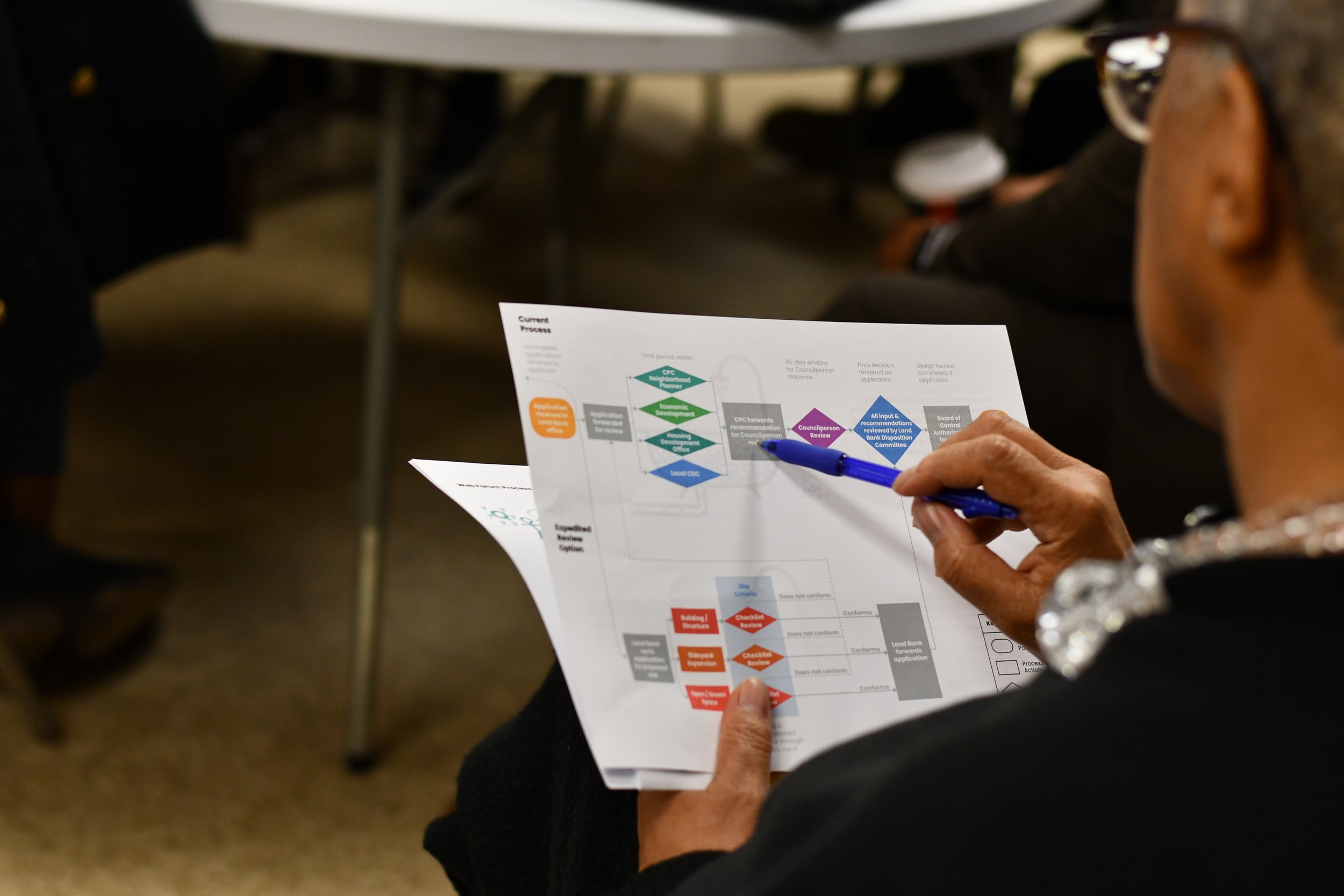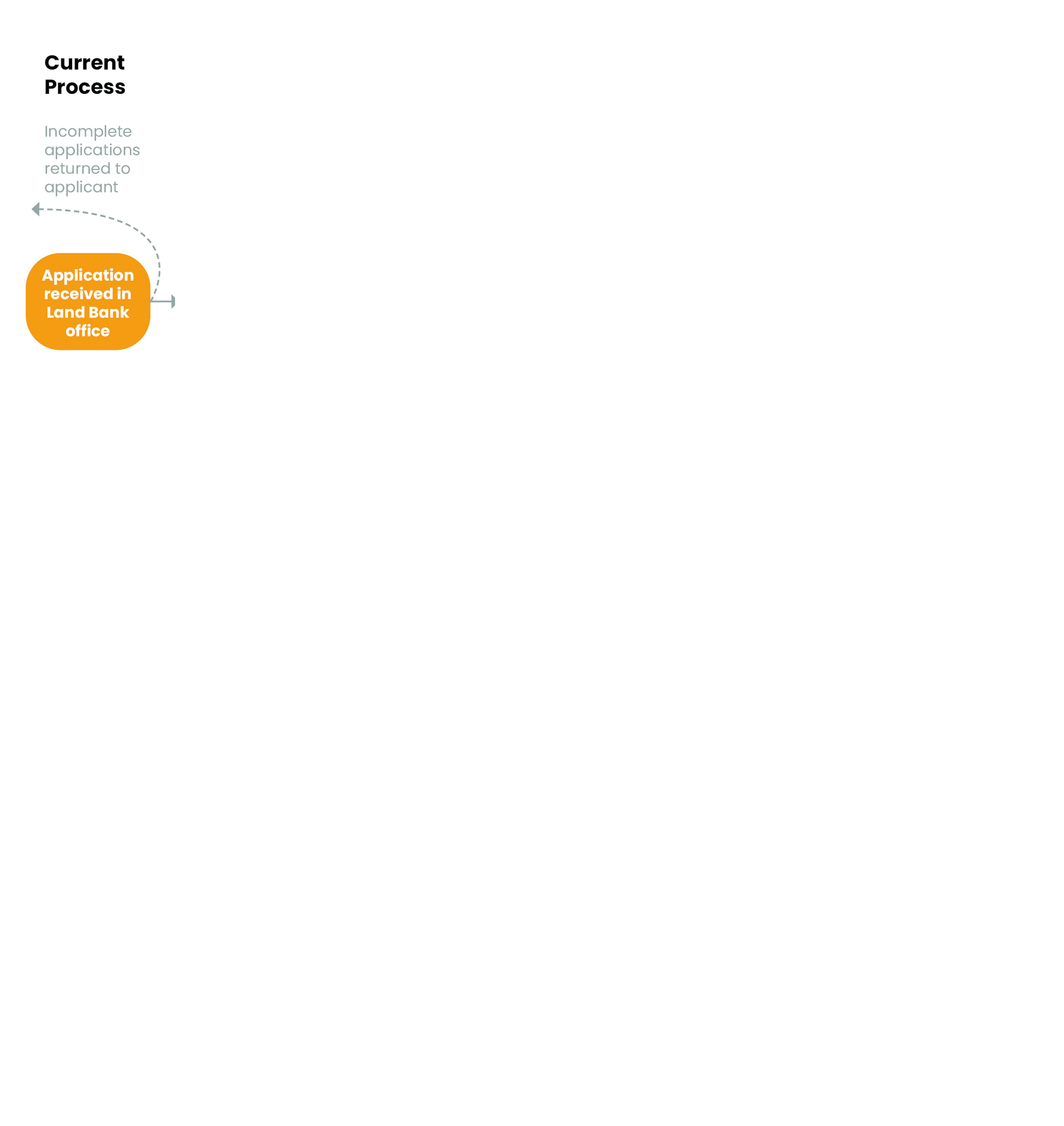
Policy & Funding
Policy & Funding
Focus Area:
Review current vacant land policy and create new policy recommendations, while integrating ideas for improving funding options for vacant land reuse projects.
Working Group Process

01
Problem Statement:
The current Cleveland Land Bank disposition process is time-intensive, reactive, and lacks strategy, causing the rate of incoming parcels to outpace the rate of parcel disposition and a steady increase in parcel inventory.
Goals:
Lots identified for large-scale development should include a deadline (expiration date) and a transition plan for alternative or interim uses.
A more effective land bank process results in more lots at their highest and best use.
Include a list of criteria for what a developer is and what the highest and best uses are for vacant land. Includes framework, definitions, and priority list.
Solutions should be transferable to other cities. (Ex. Vacant Land University. Provides education and leadership.)

02
Prototype Proposal:
A set of definitions and policies that empowers the Cleveland Land Bank to facilitate faster and more strategic disposition of vacant parcels.
03
Present Prototype to Other Working Groups:
See slides below for a summary of the prototype development process at Stakeholder Summit 3.0 held at Cleveland City Hall.

04
Prototype Development:
Updated flowchart showing Current Process and proposed Expedited Review Option for City Land Bank applications.

04.5
Results from Focus Group:
What concerns come to mind when the City makes decisions about prioritizing different uses of vacant lots?
Providing opportunities to powerful people within Cleveland or people from outside of Cleveland or people who won't be good stewards.
What criteria do you think are the least controversial?
The background of a person with gardening experience, someone who has local community support, if the project aligns with city-wide strategic goals and local community goals. People need to know their own capacity to maintain a project before applying to own a vacant parcel.
What are the land use goals for your neighborhood?
Participants repeatedly focused on the need for better maintenance of their neighborhood, and ensuring land was in the hands of good stewards. Discussion did not include topics such as housing density or desirable land uses, though there was an emphasis on open space use over housing or buildings.
05
Review of Prototype Testing Process:
How successful do you feel your prototype was at helping you better understand the problem? What did you learn from the prototype development process?
“The funding/policy group developing specific prototype has been successful because it allowed us to tailor the application process appropriately towards participant needs. I learned of various components needed to demonstrate an effective and inclusive process for implementation development.”
“This is a visual that shows the process and the time associated with walking through this process. I didn’t realize that the applicant is not kept informed of their application’s progress.”
“8/10 (success) with room for growth. As noted... Takeaway question: Did this working group [Policy & Funding] accomplish its full goal? Realizing we didn’t get into the “Funding” aspect as much as the policy & procedural aspects.”
“I feel that the prototype is helpful and removes possible bias or barriers which existed before. I do feel that transparently communicating criteria to applicants would be helpful.”
What are the most important updates you'd like to see for this prototype before it is launched to the public?
I like the idea of there being an interactive website to let residents know how their application is progressing.
Ensure we are incorporating residents/affiliates in proximity to the proposed land use in planning efforts.
An additional decision-point along the Expedited Review process line that addresses reclassification in lieu of outright rejection due to lack of conformity or capacity/scale.
Predicated on Publication of site criteria.
Also including concrete commitment documents with consequences for prospective lot users to abide by if failure to upkeep the lot.
Large scale process diagram that shows how the Policy & Funding prototype integrates with the other working group prototypes.
A list of what each neighborhood has as desires or a "wish list" as to what that neighborhood wants to see in their neighborhood.
Timeline of execution clearly expressed or shared.
Framework for the City pilot that can better position supporting agencies to be ready to respond to requests once the public has eyes on the live version prototype.
As of the interactive web site, and as a printed piece, a simplistic outline of how to get through the process with graphics and definitions.

06
Final Prototype:
Revised flowchart showing Current Process and proposed Expedited Review Option for some City Land Bank applications that meet predetermined site criteria.
Members
Chair:
Divya Sridhar, Cleveland Neighborhood Progress
Michiel Wackers, City of Cleveland
Members
Stephen Love, The Cleveland Foundation
Alyssa Hernandez, City of Cleveland
Christine McIntosh, Western Reserve Land Conservancy
Isaac Robb, Western Reserve Land Conservancy
Allison Lukacsy-Love, Greater Cleveland Partnership
Anna Sarto, City of Cleveland
Antunesia Harris, MidTown Cleveland
Ayonna Blue Donald, Enterprise Community Partners
Beth Biggins-Ramer, Cuyahoga County
Dennis Roberts, Cuyahoga County Land Bank
Gwendolyn Garth, Community Activist
Drew Sargeant, Cleveland Neighborhood Progress
Gretchen Blackwell, City of Cleveland
James Greene, City of Cleveland
Kamla Lewis, Cuyahoga County Land Bank
Kimberly Smith-Woodford, Journey on Yonder
Joe Duffy, City of Maple Heights
Marsha Garrett, City of Cleveland
Telia Badu, Little Africa Food Cooperative
Temeisha Crismon, City of Cleveland
Sean Terry, Trust for Public Land
Kimberly Brewster Shefelton, Chagrin River Watershed Partners
Michele King, The Cleveland Foundation

Join a Working Group
The Policy & Funding Working Group meets monthly at 1:00pm on the last Wednesday of every month. Meetings are primarily held online via Zoom, but may include some in-person sessions.
Join the working group below to receive an invitation to participate in the next meeting.










